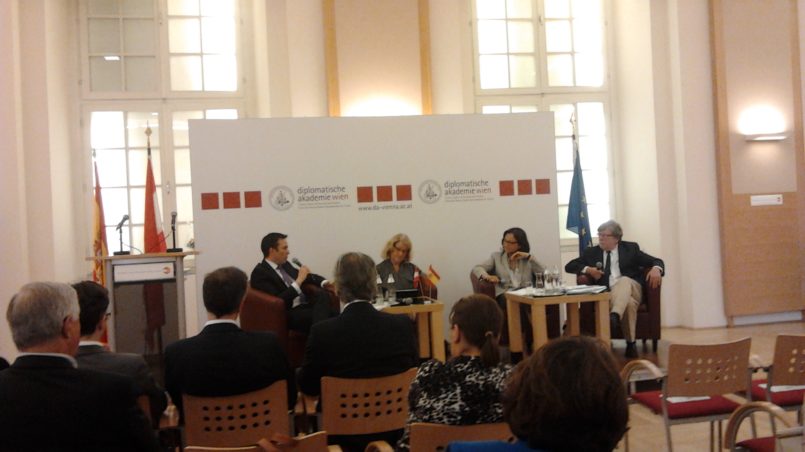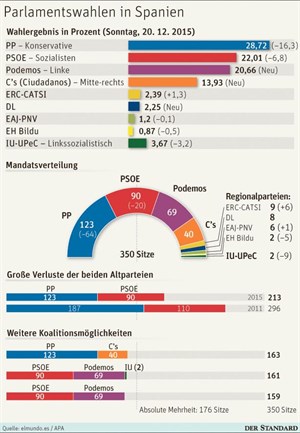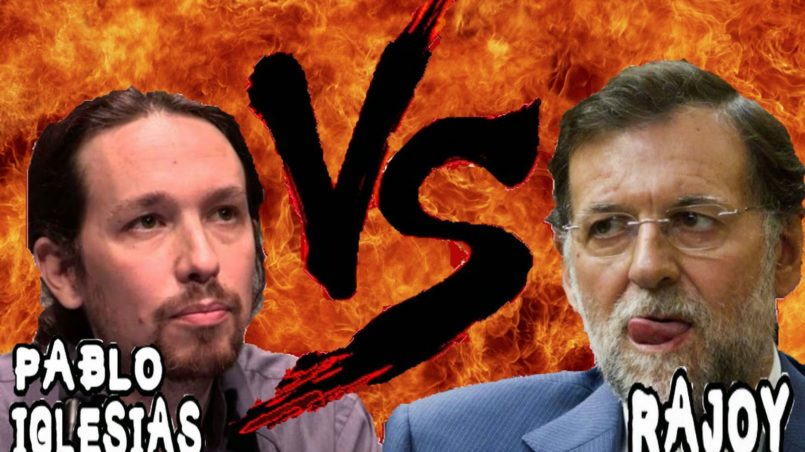Elections in Spain – a view from the outside

On June 26th 2016, elections will be held in Spain, since after the latest ballot in December, no coalition has shaped because the Podemos supporters rejected a coalition agreement. With a high voter turnout of 73 percent, thirteen parties made it into parliament, including the new movements Podemos (“We can”), a left-wing populist party who reached third place straight away, and Ciudadanos ( “citizen”), who can best be compared with our NEOs.
The success of the new parties can be explained both by the corruption affairs in which the two established parties Partido Popular (People’s Party) and Partido Socialista Obrero Español (Social Democrats) as well as the royal family are involved, and by the dismal labor market situation. Although Spain’s gross domestic product increased by three per cent last year, the unemployment rate has hardly changed. 90% of the jobs that have been created in recent years, are futures contracts, meaning they have an expiration date and low social security. Two million unemployed Spanish people have no government support, there are evictions happening everywhere. The situation in Greece and Turkey however, is expected to lead to a record turnout in summer tourism this year and thus to a certain labor market relief. The economic growth before the crisis 2007/8 was built on a huge housing bubble, in which the old parties were deeply involved. The empty villages on the Spanish coast and the golf courses, which consume vast amounts of water, but are hardly used by anyone, are common knowledge.

Until now, ever since the end of military dictatorship in Spain in 1977, there were neither early elections nor the need for a coalition. Hermine Schreiberhuber thinks, the Spanish parties are so divided amongst each other, that even after the coming election, coalitions will be very difficult to form. There is no willingness to compromise. In addition, there are numerous secessionist movements (Basque Country, Catalonia, etc) that are not interested in cooperating.
Jordi Kuhs is impressed by the modernity of the new parties. Podemos has recently put their manifesto up on the internet as a 90-page Ikea catalogue. Ikea has already reacted to this and created a new character – the Bölivar, reminiscent of the South American freedom fighter Simon Bolivar. The commercials of the “new” are creative and aggressive, often underlaid with humor and self-irony (note the man with a ponytail – an allusion to Podemos boss Pablo Iglesias). The traditional media do not play a major role with the new parties. Perhaps also due to a staccato of political discussions by journalists in the Spanish media, which Kuhs calls an overkill. Ciudadanos put the “anonymous heroes” of society to the forefront of their campaign.
Podemos is a populist, rapidly changing movement. For these elections they have partnered with the United Left party Izquierda Unida and come in second in the surveys. Party leader Pablo Iglesias, a close friend of Greece’s Alexis Tsipras, is said to have received several million Euros from Venezuela’s late President Hugo Chavez in the past decade, which Iglesias however denies. He and his colleagues want to position the party as a modern left, which does not want to leave the field of protest against the political establishment to the Nationalists, as is happening in many parts of Europe. Podemos is pro-European, but wants to change the European Union: it demands, amongst other things, an end to the austerity measures (In Spain, some also harbor the hope that Wolfgang Schäuble will be “promoted” to German president next year). So far, a coalition with the Social Democrats came to naught, for instance because of the Catalonia question – Podemos is for a referendum of the Catalans on their independence, the PSOE strictly opposed. In recent weeks, however, Podemos tried to approach the PSOE, who, if one can believe the polls, will be the big election loser on 26th of June. The fact that this was the one party which (according to the journalists present) put the most energy into forming a coalition since the last elections, is not savored by voters. On the topic of minimum wages, the two parties are expected to find a common denominator quickly. Historical detail: the gentleman who founded the PSOE in 1879, was called – Pablo Iglesias.

The Partido Popular is expected to be the strongest party in the coming election, as well. Yet it has a strategic problem: neither Podemos nor Ciudadanos will form a coalition with the People’s Party. Its leader Mariano Rajoy works primarily with people’s fears of a left experiment. His great promise – tax cut while restoring the budget –is one he will not be able to keep. Much like up until recently in Germany, there is no competition to the right of the People’s Party. Why did no right-wing populists form in Spain? Jordi Kuhs explains this fact with the serenity of the Spanish – they have learned to deal with all situations and not to choose hastily.
The crucial question will be, who the PSOE turns to. 60 percent of supporters are against a “grand coalition” with the People’s Party, the majority of the party leadership, however, is for it. There may be a personnel exchange at hand though, since the PSOE’s successful head of government of Andalusia, Susana Díaz could replace the current party leader. The former elite of socialists in Spain – referred to as “old barons”, including Filipe Gonzales – are against a coalition with Podemos. In general it can be said that the staff of the two old parties has hardly changed in recent years, despite numerous corruption cases.
A point of contention for the new government, whatever it will be, might be the abolition of §135: the Constitutional Act, which guarantees a debt brake. The Popular Party wants to maintain it, Podemos is for abolishment, the Social Democrats have not decided yet.
In answering an audience question about how the (despite Brussels’ criticism because of recent budget misdemeanors) hitherto good relations between Spain and the EU will develop when the new parties are involved in the government, the journalists say that most likely it will not change, since Podemos is a pro-European party, as well as Ciudadanos.
At the end of the panel discussion the grassroots movements of the Mayors of Barcelona and Madrid is pointed out. The system of the old parties, just like in the rest of Europe, is badly shaken – in Spain, resulting from the rampant corruption, even worse than elsewhere.
Translation from German: Serena Nebo
Credits
| Image | Title | Author | License |
|---|---|---|---|
 |
spanien wahlen | Christian Janisch | CC BY SA 4.0 |
